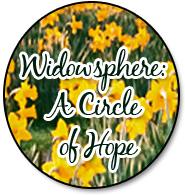Another in my series of interviews with the talented authors who contributed to On Our Own: Widowhood for Smarties. This week it's Peggy Muir, author of The Colander
TZ: Please summarize your essay for readers.
PM: The Colander is about the power of objects in our lives to become icons, to evoke memories, to trigger pain. Small things can have a big impact. When someone dies, the items he used and wore and touched seem to contain some lasting essence of the person.
TZ: I found your story delightful. It's amazing to think how one small item can evoke so many memories. How long after your husband's death did you write this?
PM: I wrote The Colander almost six years after losing my husband. And those are two things that remain impossible but I have written themk--"six years" (now seven) and "losing my husband." Impossible but true. Oh, and I still have that banged up colander.
TZ: Have you written other pieces about him?
PM: I've been writing regularly since I lost my husband. I have written mostly about the physical and psychological effects of grief which I was surprised by (eg. I lost the ability to see color for six months). I started writing haiku, liking the pithy quality of short verse. It was a way to express the outraged anger, bitterness and wry humor of the widow. I hope to finish a book and I have a lot down.
A major source of strength and reward is the small arts center we have stgarted in my husband's memory in my small Maine town. I write about his sculptures and his life.
TZ: What has been the hardest thing about widowhood for you? How have you managed to cope?
PM: I so miss the laughter. My husband was just so much fun. We laughed a lot. We could be silly together and yet tend to the serious things in life and have amazingly deep conversations. There are special times when I start laughing at something and feel him smiling. Touch is also something I miss. At times I have felt as though the palms of my hands would burst into flames if I couldn't touch him again, just to hold hands.
Wow. Coping. Sometimes I do, sometimes I don't. Sometimes I go for long walks, sometimes I read what I call "bathtub novels", sometimes I go to bed. And it has been truly lovely to find him again in my dreams.
My son and daughter-in-law and my grandson are so important. When the grief was new, special friends became my guides and saviors, one wonderful couple still has me for music and food weekly. Massages help. And art,. I think, as I wrote in one haiku, that humor has helped a lot. "Why me" became "Why not me?" Turning outward has helped--i.e. doing things for my family and my town.
TZ. What are you most proud of that you've accomplished as a widow?
PM. When my husband died, I had to decide what to do about Toad, the 26 foot long sloop scow he had built for us. We had sailed together for over 20 years, but I had never taken the boat out on my own. I had to get her ready, learning to do the scraping-caulking-painting. and she's a big boat, learning to run the motor solo, wield the lee boards and haul up the sails alone. And then, slowly, I learned to run her on our demanding river and bay, and finally could sail solo. I have been captain of Toad for 7 years and it gives me immense pride and joy.
TZ: Tell us about your writing background and a little about your writing process.
PM: My father was a writer who wrote every day of his life, so I grew up seeing the hard work and discipline and rewards of the writing life. I enjoyed writing in school and still feel I write nonfiction best. My graduate work in anthropology required a lot of writing. My husband was a Wall Street reporter at 18 when we met and he was always able to dash off an article and sell it to a magazine or newspaper. We started to write together and published a number of articles. I was a public high school teacher for 29 years and started writing a lot about education and what I taught as well as curriculum and reports.
I have writing spurts. I jot down lines or phrases that touch off my thinking. I often sit down at the computer with my coffee, check my email and then start writing.
TZ: Any advice for writers? How about for widows?
PM: It was really liberating when I realized you don't have to start writing at the beginning--i.e. you can write chunks and string them together and move them around and even write the first serences last. Just start. Get it down. If you can't find the right word, leave dashes and go back.
The first advice for new widows is just to breathe because that in itself will be the hardest thing imaginable. There is no "getting through" or "getting over" the death of the love of your life, but you do learn to go on. I think it's important to say ( and some people I know really don't like this) that I don't think I will ever be 100% again and that's okay. I have a good life and many joys and rewards. And I was so very lucky to have had the years with my husband
You can purchase a copy of On Our Own: Widowhood for Smarties on Amazon or Barnes and Noble or from the publisher at www.silverboomerbooks.com.
Thursday, January 10, 2013
Subscribe to:
Post Comments (Atom)














0 comments:
Post a Comment